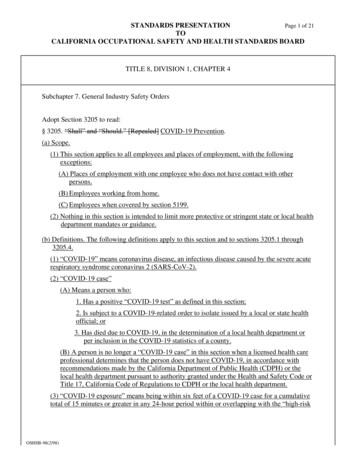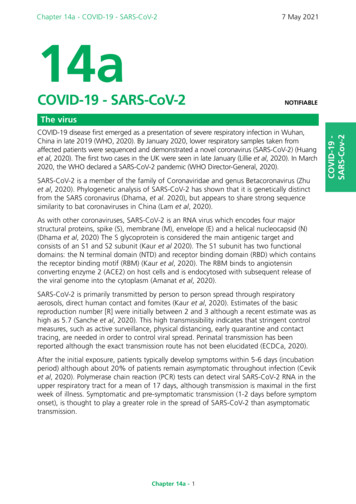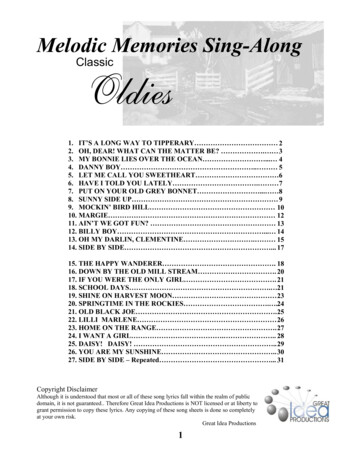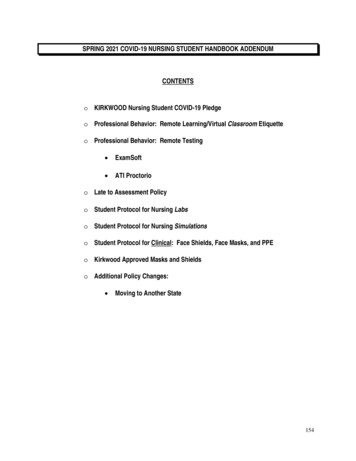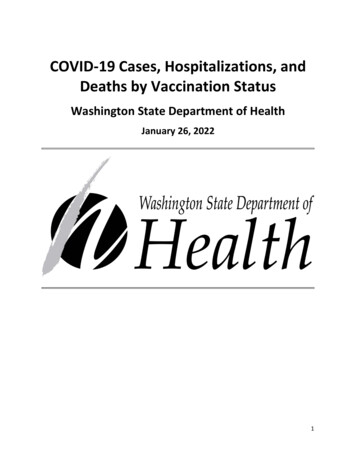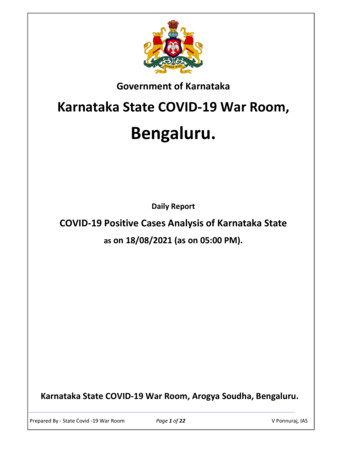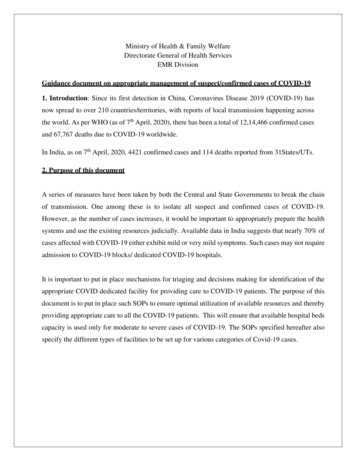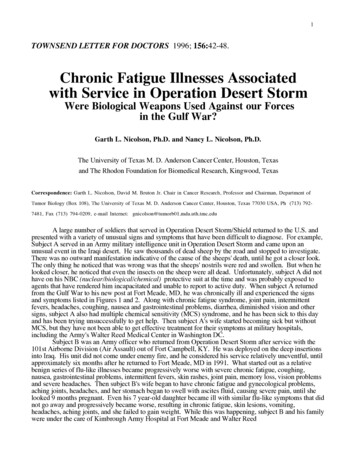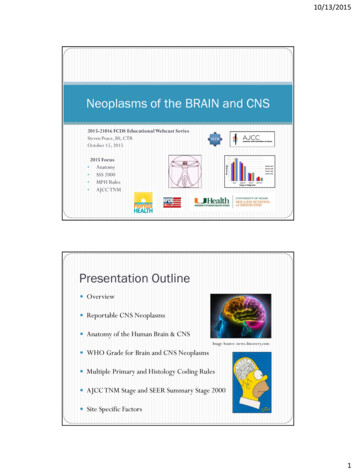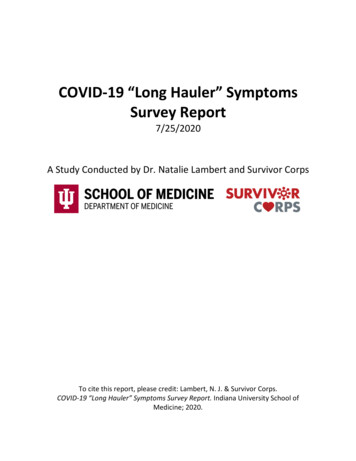
Transcription
COVID-19 “Long Hauler” SymptomsSurvey Report7/25/2020A Study Conducted by Dr. Natalie Lambert and Survivor CorpsTo cite this report, please credit: Lambert, N. J. & Survivor Corps.COVID-19 “Long Hauler” Symptoms Survey Report. Indiana University School ofMedicine; 2020.
COVID-19 “Long Hauler” Symptoms Survey ReportData collected: 7/25/2020Source: Survivor Corp Facebook group surveyTotal Respondents: 1,567 Dr. Natalie LambertIndiana University School of Medicine - Email: nalamb@iu.eduTo cite this report, please credit: Lambert, N. J. & Survivor Corps. COVID-19 “Long Hauler”Symptoms Survey Report. Indiana University School of Medicine; 2020.The results of this study are the reported experiences of people suffering from long-term COVID19 symptoms, colloquially known as “Long Haulers.” This is not a peer-reviewed study. Data wasanalyzed by an experienced researcher and we invite any researchers interested in SurvivorCorps data to contact us at HQ@survivorcorps.com.Survivor Corps is a grassroots movement connecting, educating and mobilizing COVID-19survivors with the medical, scientific and academic research community to help stem the tide ofthis pandemic and assist in the national recovery.Context: Many members of Survivor Corps report suffering from long-term symptoms ofCOVID-19 and have taken to calling themselves “Long Haulers.” The forum founder, DianaBerrent, posted a survey on the Survivor Corps Facebook page asking members who identifiedas Long Haulers to respond by selecting all of the COVID-19-related symptoms they haveexperienced. The survey symptom list was based on initial COVID-19 research conducted byresearchers affiliated with Survivor Corps, Dr. Natalie Lambert at Indiana University School ofMedicine and Dr. Wendy Chung at Colombia University Irving Medical Center. The survey wasmade “open” so that survey participants could add symptoms to the list, and then futureparticipants could also select the participant-added symptoms.Summary of Survey Findings: Long Haulers’ COVID-19 symptoms are far more numerous than what is currently listedon the CDC’s websiteWhile the impact of COVID-19 on the lungs and vascular system have received somemedia and medical attention, the results of this survey suggest that brain, whole body,eye, and skin symptoms are also frequent-occurring health problems for peoplerecovering from COVID-19Survivor Corp group members frequently report reaching out to primary care doctorsfor help managing such lesser-known and painful symptoms, but find that somephysicians are unable or unwilling to help patients manage these due to lack of researchA reported 26.5% of symptoms experienced by Long Haulers are described as painful bythe group members2
Dr. Lambert collected and analyzed the survey responses. The results are broken down in thefollowing figures: Figure 1: Survey prompt posted in the Survivor Corps Facebook group pageFigure 2: 50 most commonly reported Long Hauler symptomsFigure 3: COVID-19 symptoms according to the CDC (for reference)Figure 4: How the Survivor Corps survey results compare to the COVID-19 symptomscurrently listed on the CDC websiteFigure 5: Flow graph which breaks the reported symptoms into quartiles to bettervisualize the relative prevalence of the symptoms. Symptoms in the first quartile are themost commonly reported by Long Haulers and those in the fourth quartile are the leastcommonly reported.Figure 6: Dr. Lambert first categorized each symptom according to the primary symptomlocation in the body and then created a flow graph to visualize which organs are mostimpacted by long-lasting COVID-19 symptomsFigure 7: Displays the of symptoms associated with painFigure 8: Full list of COVID-19 symptoms (n 98) selected by survey participantsFigure 1. Survey Prompt Posted in the Survivor Corps Group PageInterpretation of Findings: The results of the analysis suggest that Long Haulers’ COVID-19symptoms are far more numerous than what is currently listed on the CDC’s website. While thesymptoms listed on the CDC’s website are, except for nausea or vomiting, some of the mostcommon COVID-19 symptoms reported by Long Haulers, the mismatch between the healthproblems people are experiencing and the information that they can find from official healthsources is noticeable and a potential cause for concern. It is understandable that healthorganizations do not list symptoms until there is more research validating whether a symptomis COVID-19 related or due to another illness, but at the same time the lack of informationabout the broad range of long-term COVID-19 symptoms may and likely does drive people tounofficial sources of health information online. Survivor Corps, for instance, is one place onlinewhere people who believe they have COVID-19 are going for information and advice.3
Additionally, while the impact of COVID-19 on the lungs and vascular system have receivedsome media and medical attention, the results of this survey suggest that brain, whole body,joints, eye, and skin symptoms are also frequent-occurring health problems for peoplerecovering from COVID-19. More attention and research should be focused on how the virusimpacts these organs, especially in terms of giving COVID-19 patients relief from reducedcognitive functioning, sleep problems, and vision problems.A simple coding of the participant-reported symptoms according to which caused pain revealedthat 26.5% of symptoms experiences by Long Haulers are painful. There is not yet a widelyaccepted narrative in the news media or medical fields that people with COVID-19 who arerecovering at home - like many Long Haulers - are often suffering from painful symptoms. Thesurvey results show that body aches, nerve pain, and joint pain are frequent, and commentswithin the Survivor Corps group anecdotally show that this pain can be extreme and difficult tomanage. In the group posts and comments, group members frequently report reaching out totheir primary care doctors for help managing such lesser-known symptoms but find that theirphysicians are sometimes unable or unwilling to help patients manage lesser known COVID-19symptoms due to lack of research. Until research into long-term COVID-19 symptoms isconducted, these results indicate that an ever-increasing number of COVID-19 patientscontinue to suffer from their untreated symptoms.This study was a simple survey, but yields results that can begin to guide future COVID-19research in directions that are very meaningful for those who suffer from the disease. Thisresearch can be greatly expanded through analysis of the tens of thousands of posts in theSurvivor Corps Facebook group. Survivor Corps members generously share information aboutthe progression of their disease, their symptoms, and what medical treatments were found tobe effective. We hope that this study and our future research using the Survivor Corps datasetwill give back to the community that has so generously donated their time tracking andunderstanding a terrible disease.Acknowledgements: We would like to thank the Indiana University Precision Health Initiativefor its support and the thousands of Survivor Corps members who are fighting the virus, as wellas those who have lost their lives to the disease.4
Figure 2. The 50 Most Common Long Hauler Symptoms5
Figure 3. COVID-19 Symptoms According to the CDCSource: -testing/symptoms.htmlon 7/25/20206
Figure 4. CDC Verses Long Hauler Reported COVID-19 Symptoms7
Figure 5. COVID-19 Symptoms Reported by Long Haulers by Quartile8
Figure 6. COVID-19 Symptoms Reported by Long Haulers by Symptom Location9
Figure 7. Painful Symptoms Reported by Long HaulersPainful SymptomsMuscle or body achesFeeling of burning skinHeadacheBone aches in extremitiesPersistent chest pain or pressure Neck muscle painJoint painKidney painSore throatCostochondritisNeuropathy in feet and handsPainful scalpReflux or heartburnBurning sensationsAbdominal painMid-back pain at base of ribsLower back painJaw painCalf crampsHand or wrist painUpper back painCold burning feeling in lungsSharp or sudden chest painFoot painMouth sores or sore tongueUTILow back pain10
Figure 8. Full List of Symptoms Reported by Long Haulers (n 98)SymptomFatigueMuscle or body achesShortness of breath or difficulty breathingDifficulty concentrating or focusingInability to exercise or be activeHeadacheDifficulty sleepingAnxietyMemory problemsDizzinessPersistent chest pain or pressureCoughJoint painHeart palpitationsDiarrheaSore throatNight sweatsPartial or complete loss of sense of smellTachycardiaFever or chillsHair lossBlurry visionCongested or runny noseSadnessNeuropathy in feet and handsReflux or heartburnChanging symptomsPartial or complete loss of sense of tastePhlegm in back of throatAbdominal painLower back painShortness of breath or exhaustion from bending overNausea or vomitingWeight gainClogged earsDry eyesCalf crampsTremors or shakiness# 6134431931831430026726425825711
Sleeping more than normalUpper back painFloaters or flashes of light in visionRashConstant thirstNerve sensationsTinnitus or humming in earsChanged sense of tasteSharp or sudden chest painConfusionMuscle twitchingFeeling irritableWeight lossPost nasal dripDry throatHigh blood pressureDry or peeling skinSwollen hands or feetHeat intoleranceMouth sores or sore tongueNeck muscle painChills but no fever"Hot" blood rushPhantom smellsBone aches in extremitiesFeeling of burning skinExtreme pressure at base of head or occipital nerveSwollen lymph nodesBrain pressureKidney painSpikes in blood pressureCostochondritisHand or wrist painBulging veinsAbnormally low temperatureMid-back pain at base of ribsBurning sensationsJaw painPainful scalpArrhythmiaLow blood 896959184838080787712
Cold burning feeling in lungsCracked or dry lipsGoiter or lump in throatFoot painEye stye or infectionCovid toesLow blood pressureDry scalp or dandruffKidney issues or protein in urineUTIHormone imbalancesThrushGerd with excessive salivationPersonality change (drastic)Herpes, EBV, or Trigeminal neuralgiaAnemiaElevated thyroidBilateral neck throbbing around lymph 13
Floaters or flashes of light in vision 249 Rash 247 Constant thirst 246 Nerve sensations 243 Tinnitus or humming in ears 233 Changed sense of taste 221 Sharp or sudden chest pain 210 Confusion 205 Muscle twitching 204 Feel
